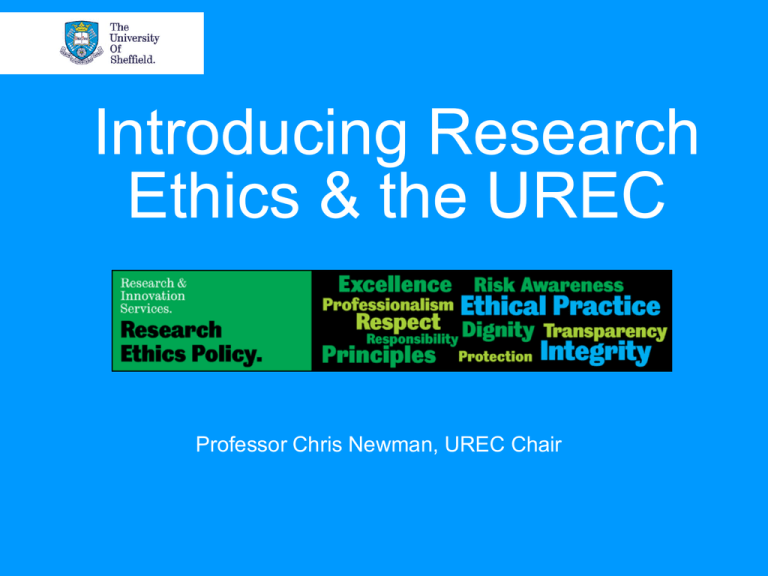Introducing Research Ethics & the UREC Professor Chris Newman, UREC Chair
advertisement

Introducing Research Ethics & the UREC Professor Chris Newman, UREC Chair All research projects involving human participants, personal data or human tissue must obtain ethics approval before the research commences Definition of ‘research’ • All investigation undertaken to acquire knowledge and understanding* including: work of educational value designed to improve understanding of research process administrative research e.g. by Professional Services *definition taken from Research Assessment Exercise 2008 Definition of ‘research’ • But NOT including: Routine audit and evaluation Routine testing and analysis of materials, components, processes etc • Ethics is part of doing the best possible research...with integrity • Ethics is about how we conduct our research, from start to finish. • Ethics is about how we treat those involved in, or affected by, our research. Fundamental principles • Participants rights: informed consent security (data/samples) confidentiality safety • Researcher’s obligations: honesty minimising risks integrity cultural sensitivity Ethics review procedure for all research involving human participants, personal data and/or human tissue The University’s approach • University Research Ethics Committee (UREC) – oversight & monitoring (representatives from each Faculty) • Devolved to departments to ethically review applications • Each department has: o A pool of ethics reviewers o a Principal Ethics Contact o an Ethics Administrator The University’s approach • Based on trusting colleagues but balanced with monitoring • Based on the belief that disciplines know their own fields best • Based on policy dissemination and staff development The University’s approach • Based on the belief that self-regulation results in greater engagement than topdown regulation • Based on the belief that involving more people in ethics review results in a greater awareness UREC’s key tasks… • To promote awareness and understanding of research ethics throughout the University • To advise on any research ethics matters that are referred to it from within the University, including on the interpretation of the Research Ethics Policy • To monitor the ethics review procedure as administered by departments • To keep abreast of the external research ethics environment and ensure that the University responds to all external requirements. What UREC doesn’t do… • The ethical review of individual applications: • unless an applicant has appealed, or • the department cannot reach a decision. • Give advice on ethical issues that are not concerned with research. Further resources: http://www.shef.ac.uk/ethics


